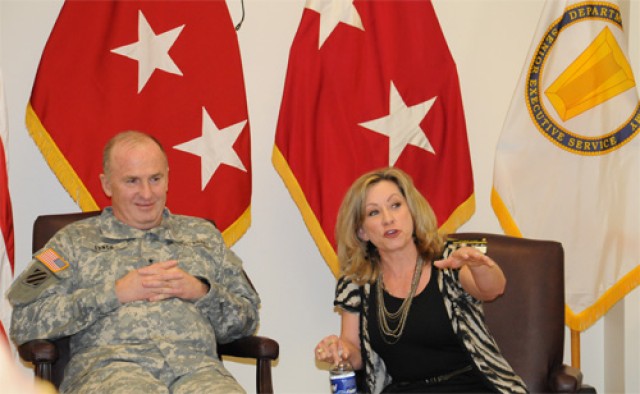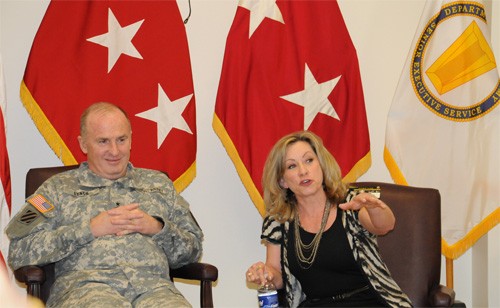FORT LEE, Va. (Feb. 24, 2011) -- Lt. Gen. Rick Lynch, the commander of Installation Management Command, and his wife, Sarah, came to Fort Lee Feb. 17 to visit various facilities on post and meet with military families, installation employees and organizational leaders.
Much of the general's time was devoted to discussions with directorate heads with the central question being how he could help them do their jobs better. Meanwhile, Mrs. Lynch spent the lion's share of her day in the Fort Lee Army Community Service area where she learned more about various family support programs here and met with family readiness group representatives and military spouses and service members.
A key event during the duo's visit to Lee was the ACS Transformation focus group, where an audience comprised of Soldiers, military family members and others had an opportunity to discuss the current state of ACS programs and what is needed to increase their effectiveness in the future.
Lynch asked the focus group to consider three issues: how can the Army overcome the negative stigma of seeking help through ACS; how are people who live off post getting information about ACS; and where does the ACS director fit into the hierarchy of garrison staff and is there a better place for that individual'
"How do we transform ACS'" said Lynch. "How do we do a better job of service delivery of family programs to family members' The only way we're going to know that is if you tell us."
Lynch, who describes himself as a "family first" general, said his central focus is taking care of Soldiers, their loved ones, and the civilian workforce that supports them.
One of the thoughts that "keeps him up at night," Lynch said, is the apparent lack of knowledge or understanding about how ACS programs can help families. That issue is one of the main considerations of ACS transformation. The IMCOM chief emphasized the importance of ensuring that families know about the programs offered and how they can help them conquer the hardships of military life. Getting the word out about the ACS programs, he said, would be an important part of the transformation.
Sharing their experiences with ACS, many of the family members in attendance at the focus group said they truly appreciated the support services offered at Fort Lee. They also agreed that it's sometimes difficult to obtain knowledge about ACS programs, especially when new to an installation or the military itself.
One idea that came up during the meeting was to establish satellite locations off post that would have information about ACS programs.
"Imagine having a location at a Wal-Mart - a place people go already - with an information kiosk and pamphlets about programs on post," said Lynch.
Another issue Lynch said he's seen at some installations is ACS staff members who are too specialized and turn customers away because the person responsible for a particular program was out of the office and they could not provide the needed assistance.
"What we are trying to do is to have fewer specialists and more generalists so whatever your issue may be, they can help you," said Lynch.
Fort Lee is set to be one of the 21 out of 161 Army installations that will be a pilot installation for the new ACS transformation.
"It's an important project that we are working on - I was happy to volunteer the post to be one of the pilots," said Maj. Gen. James L. Hodge, CASCOM and Fort Lee commanding general. "In the end, I hope we'll make it a better program."


Social Sharing